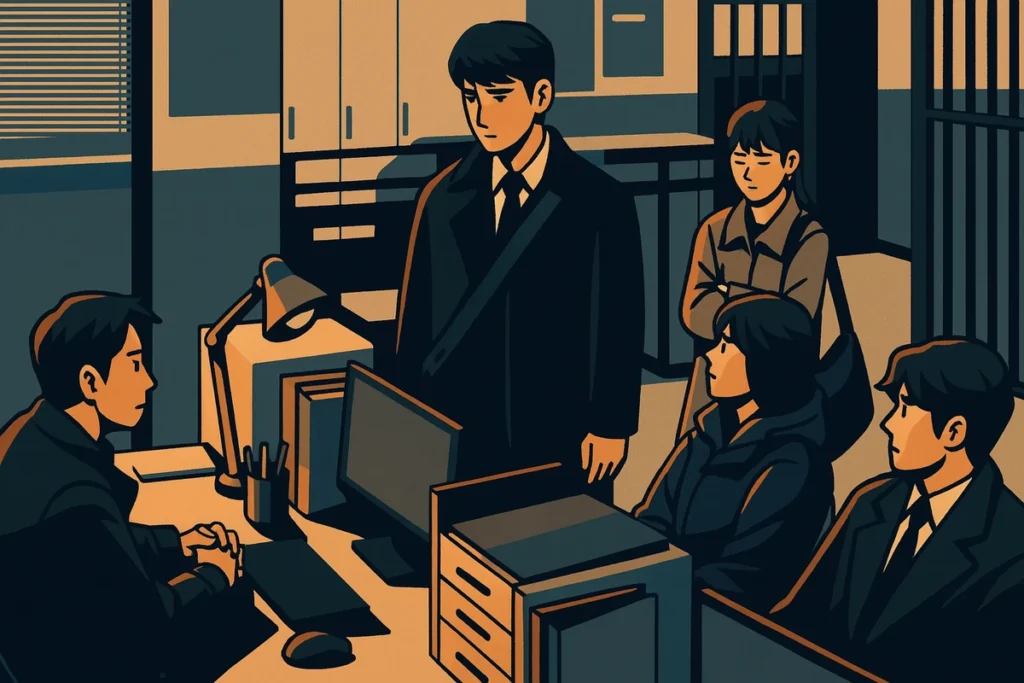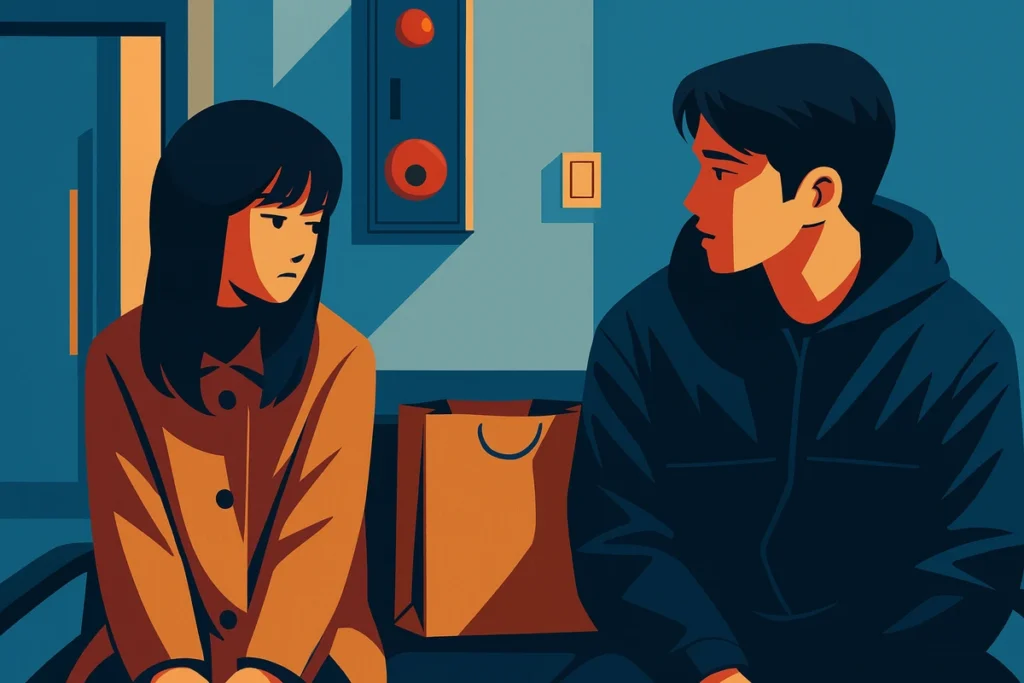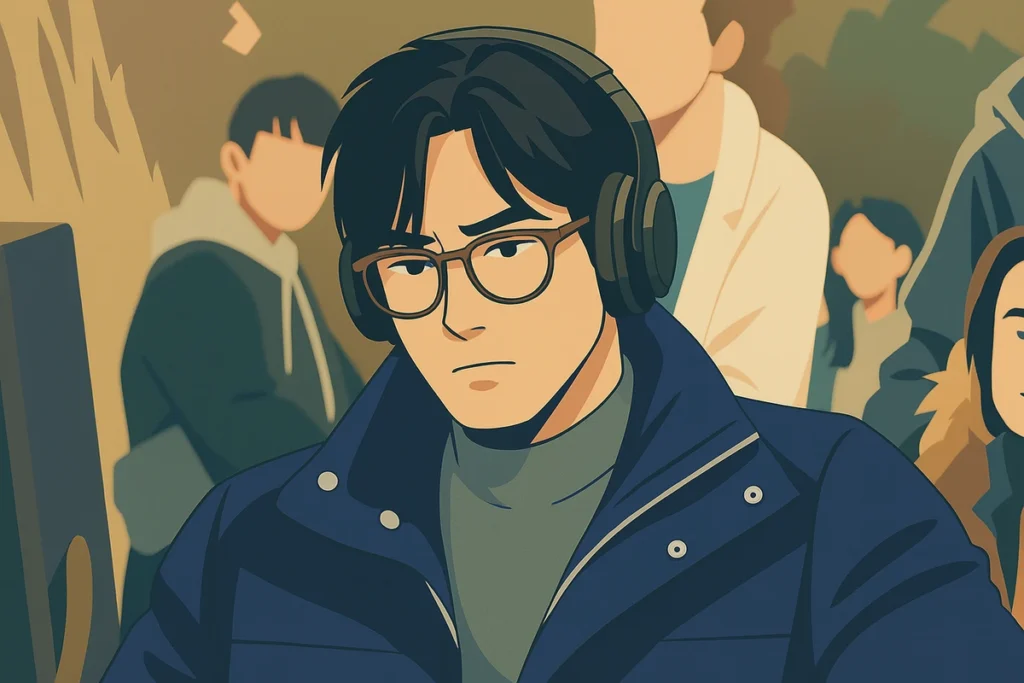[Image Source] AI illustration by DALL·E
TL;DR – “I won’t withdraw” hits harder in Korean.
Korean dramas don’t shy away from legal or emotional intensity—and ‘Our Unwritten Seoul’ delivers both in this gripping courtroom confrontation.
The phrase “이번엔 취하 안합니다.” (I won’t withdraw this time) carries the weight of cultural change, legal courage, and emotional closure.
This post unpacks legal phrases, cultural nuance, and grammar that make this scene unforgettable.
📢 To protect copyright, all dialogue has been rephrased while preserving the original context. I appreciate your understanding.
This post introduces a scene set in a Korean police station. The dialogue includes phrases commonly heard and used in police and courtroom settings. You never know—you might find yourself in a similar situation in Korea, so it’s good to get a feel for the atmosphere in advance.
Today’s highlight is Yu Mi-rae’s courage as a sexual harassment victim. In Korea, the reporting rate for sexual assault and harassment is relatively low, and there has been a noticeable rise in #MeToo cases in recent years. “Me Too” here means, “It happened to me too.” As someone who supports justice, I invite you to join in the effort to build a fairer society.
1. Scene Snapshot
A stark yet empowering moment unfolds inside a Korean police station. The tension isn’t in the shouting—it’s in the silences, in the words chosen precisely, and in the refusal to be silenced. Yoo Mi-rae, standing up against sexual harassment, doesn’t just speak for herself; she becomes the voice for many who couldn’t.
Across from her, the accused tries to maintain composure, while her younger sister Mi-ji and lawyer Ho-su form a firm wall of support. This is legal language meets real-life courage—where Korean honorifics, emotional omission, and sentence endings carry more weight than any gavel strike.
📺 Watch the original scene here.
[Source] YouTube, @DiggleClassic
This is a typical scene at a Korean police station. The victim, the suspect (offender), an investigator, and a lawyer are all present, discussing the other party’s fault and whether the act was justifiable self-defense.
2. Micro-Dialogue
2-1. “이번엔 물러서지 않을 거예요.”
“I won’t back down this time.”
2-2. “정당한 방어였다고 생각합니다.”
“I believe it was a justifiable act.”
2-3. “변호인으로 동석할 수 있습니까?”
“May I sit in as legal counsel?”
2-4. “저는 합의할 생각 없습니다.”
“I have no intention to settle.”
2-5. “무고라는 주장, 받아들일 수 없습니다.”
“We reject the claim that it was a false accusation.”
3. Culture & Subtext
– “물러서지 않을 거예요” carries an emotional undertone not often expressed in Korean courtrooms. It’s an act of defiance in a society where many victims remain silent.
– The formality in “변호인으로 동석할 수 있습니까?” isn’t just respectful; it signals power, hierarchy, and controlled authority in high-stakes situations.
– Saying “합의 없습니다” is like slamming a door shut—it’s final, emotionless on the surface, but burning with quiet fury underneath.
– The contrast between legal jargon and trembling voice shows Korea’s evolving public consciousness on harassment. Words like “정당행위” and “무고” are legal shields—but also emotional battlegrounds.
– This scene reflects a shifting era. The #MeToo movement in Korea has challenged the long-standing norms of silence and shame. Mi-rae’s line isn’t just personal—it echoes nationally.
❓ FAQ (Frequently Asked Questions)
Q1. What does “합의 없다” actually mean in Korean legal situations?
In Korea, “합의 없다” literally means “no settlement.” It’s a direct way of saying the speaker will not resolve the matter privately. It often implies a willingness to pursue formal legal channels such as filing charges or going to court.
Q2. Is it common for victims to refuse settlement in Korean dramas?
Not really. Many K-dramas portray characters agreeing to settlements under pressure. That’s why scenes where a character says “합의 없습니다” stand out—they represent strength and a shift in societal awareness about justice and victim empowerment.
Q3. What is “무고” and why is it controversial?
“무고” means false accusation. In legal terms, it refers to reporting someone for a crime they didn’t commit. It’s controversial in Korea because it’s sometimes weaponized in counterclaims, especially in harassment or assault cases. This adds fear and complexity for real victims.
Q4. Can foreigners use these phrases if they’re in legal trouble in Korea?
Yes, but cautiously. If you’re involved in a legal case in Korea, it’s best to have legal representation. Phrases like “변호인으로 동석할 수 있습니까?” (May I sit in as legal counsel?) or “법대로 할게요” (I’ll go by the law) can be helpful, but context and tone matter greatly.
Q5. What’s the emotional nuance of “물러서지 않아요”?
It’s more than “I won’t back down.” It signals emotional resistance, determination, and a personal boundary being drawn. Especially in high-stress settings like police interviews, this phrase carries weight and resolve.
4. Grammatical Analysis of the Dialogue
4-1. “진술할 때, 제가 같이 있어도 괜찮을까요?”
🔍 Analysis
– 진술할 때: 진술하다 (to testify, give a statement) + temporal expression -할 때 (when)
– 제가: humble subject pronoun 저 + subject particle -가
– 같이 있어도: 같이 있다 (to be together) + -아/어도 (even if; permission tone)
– 괜찮을까요?: polite tentative interrogative form of 괜찮다 (to be okay)
📌 Example Usage
“회의할 때, 제가 같이 있어도 괜찮을까요?”
Would it be alright if I’m present during the meeting?
☀️ Meaning
A humble and respectful request to stay present during someone’s testimony.
Less formal than legal phrasing like “동석해도 되겠습니까?”, but warmer and more protective.
🧩 Similar Patterns
“면담할 때, 제가 옆에 있어도 괜찮겠어요?”
Would it be all right if I sit in during the consultation?
“진료 받으실 때 제가 같이 들어가도 될까요?”
May I accompany you during your medical checkup?
💬 Usage & Variation
공식적: “동석을 요청드립니다.”
I request to be present.
부드럽게: “제가 잠깐만 옆에 있어도 괜찮아요?”
Would it be okay if I stay by your side just for a moment?
캐주얼: “나 옆에 있어도 되지?”
I can stay with you, right?
4-2. “그때도 사실 아닌 걸로 고발하더니, 이번에도 똑같네요?”
🔍 Analysis
– 그때도: “even back then”; emphasis on a repeated pattern
– 사실 아닌 걸로: 사실 아니다 (not true) → noun-modifier -ㄴ 것 → 것으로 → casual contraction 걸로
– 고발하더니: 고발하다 (to report) + connector -더니 (and then; contrast with current)
– 이번에도: “this time too”
– 똑같네요?: 똑같다 (same) + -네요? (surprised or confirming tone)
📌 Example Usage
“예전에도 말도 안 되는 걸로 시비 걸더니, 또 그러네요?”
You picked a fight back then with nonsense, and now again?
☀️ Meaning
A frustrated rhetorical question implying repetition of false accusations.
Combines bitterness, disbelief, and sarcasm in spoken form.
🧩 Similar Patterns
“그때도 나한테 그러더니, 지금 또야?”
You did this to me back then, too, and again now?
“예전처럼 말 돌리시네요?”
You’re dodging again, just like before?
💬 Usage & Variation
냉소적: “또 그 소리예요?”
You’re saying that again?
공손: “이전 상황과 비슷한 맥락인가요?”
Is this similar to the previous situation?
공격적: “예전처럼 또 억지 부리시는 거예요?”
Are you making a fuss again like last time?
4-3. “이번엔 끝까지 갈 거예요. 안 멈춰요.”
🔍 Analysis
– 이번엔: “as for this time”; topic particle emphasizing contrast with the past (이번에는 → contracted to 이번엔)
– 끝까지 갈 거예요: 끝까지 (to the end) + 가다 (to go) + -ㄹ 거예요 (future polite); expresses determination to see something through without quitting
– 안 멈춰요: negation of 멈추다 (to stop); full form 멈추지 않아요 → spoken short form 안 멈춰요; affirms persistence and refusal to stop
📌 Example Usage
“이번엔 내가 끝까지 다 말할 거야. 안 참아.”
This time I’ll say everything. I won’t hold back.
☀️ Meaning
A personal vow, emotionally charged. Expresses a shift from previous silence to present action.
🧩 Similar Patterns
“이젠 포기 안 해요.”
I’m not giving up anymore.
“이번엔 참지 않을 거예요.”
This time, I won’t stay silent.
💬 Usage & Variation
강하게: “이번엔 절대 물러서지 않아요.”
This time, I won’t step back no matter what.
부드럽게: “이번엔 좀 다르게 해보려 해요.”
I’m trying a different approach this time.
공격적: “끝까지 가볼게요. 각오하세요.”
I’ll take this all the way. Be ready.
4-4. “그 사람, 손목 잡고 협박한 건데… 상황 보면 도와준 쪽에 가깝지 않나요?”
🔍 Analysis
– 그 사람: “that person”; topic of the sentence, often used in a distancing or neutral tone, depending on context
– 손목 잡고 협박한 건데:
| 손목(wrist) + 잡다(to grab) + -고 (and)
| 협박하다(to threaten)
| -ㄴ 건데: contraction of 것인데→ noun modifier -ㄴ (협박한) + 것 + 이다 + -는데
| Overall nuance: “He did grab the wrist and threaten, but…”; implies a turn or contrast in judgment
– 상황 보면: 상황 (situation) + 보다 (to look/see) + -면 (if)
| “If you look at the situation” — a conditional clause that softens or reframes the earlier accusation
– 도와준 쪽에 가깝지 않나요?:
| 도와주다(to help) + noun modifier -ㄴ→ 도와준
| 쪽(side, perspective) + 에 가깝다(to be closer to)
| -지 않나요?: rhetorical question in polite tone; seeking agreement or planting doubt
| Complete sense: “Isn’t it more like he helped?” — invites reinterpretation of the act
📌 Example Usage
“말은 거칠었지만, 상황 보면 오히려 걱정해서 그런 거 아닌가요?”
He spoke harshly, but wasn’t he actually concerned?
☀️ Meaning
An indirect defense of someone’s behavior, pointing to the bigger picture.
🧩 Similar Patterns
“오히려 보호하려던 행동 아니었을까요?”
Couldn’t it have been an act of protection?
“그렇게 나쁜 의도는 아니었던 것 같죠?”
Doesn’t seem like it was ill-intended, right?
💬 Usage & Variation
더 딱딱하게: “법적으로 보면 위협보다 구조에 해당합니다.”
Legally, this could be considered a rescue rather than a threat.
더 부드럽게: “그냥 놀라서 그런 행동 했던 걸 수도 있어요.”
Maybe he just acted that way because he was startled.
상황 강조: “맥락까지 보면 그렇게만 볼 순 없죠.”
If you consider the full context, you can’t see it one way.
4-5. “사적으로 풀 생각 없어요. 법대로 할게요.”
🔍 Analysis
– 사적으로 풀 생각 없어요:
| 사적(private, personal) + -으로(adverbial suffix) → 사적으로 (in a personal/private way)
| 풀다(to resolve, to settle)
| -ㄹ 생각 없다: “have no intention to…”
| Polite present form: 없어요
| Full meaning: “I have no intention of resolving this privately”; emotionally neutral but firm tone
– 법대로 할게요:
| 법(law) + -대로(as per, in accordance with) → 법대로= “according to the law”
| 하다(to do) + -ㄹ게요: informal future ending indicating speaker’s decision or promise with resolve
| Tone: calm, polite, but assertive — implies a shift from personal resolution to formal/legal action
📌 Example Usage
“그냥 넘어가지 않을 거예요. 법대로 할 겁니다.”
I won’t let this slide. I’ll take legal action.
☀️ Meaning
A decisive ending line to draw the boundary and deny any informal settlement.
Sounds final, but spoken and natural.
🧩 Similar Patterns
“이건 그냥 넘기지 않을 거예요.”
I won’t let this go quietly.
“원칙대로 처리하겠습니다.”
We’ll handle this according to procedure.
💬 Usage & Variation
강하게: “합의는 없어요. 고소합니다.”
No settlement. I’m pressing charges.
더 정중하게: “변호사 통해서 절차 진행하겠습니다.”
I’ll proceed through legal channels with my lawyer.
캐주얼하게: “이건 그냥 못 넘기지.”
No way I’m letting this go.
5. Natural Korean Toolkit
📌 Expression Variations
– “물러서지 않다” → “포기하지 않다”, “뒤로 물러나지 않다”
“not back down” → “not give up”, “not step back”
– “합의 없다” → “합의 안 해요”, “협상 의사 없습니다”
“no settlement” → “I won’t settle”, “I’m not open to negotiation”
💬 Speech Style Shift
– Formal: “정당행위라고 판단됩니다” – “It is considered a justifiable act”
– Casual: “그냥 정당한 행동이었어” – “It was simply a justifiable act”
🐾 Omission Pattern
– Subject-dropping in legal lines is common for objectivity:
• “(저는) 합의할 생각 없습니다.” → more formal, “I have no intention to settle.”
• “(우리는) 물러서지 않아요.” → emotional emphasis, “We won’t back down.”
🧭 Dialect & Honorifics
– Legal dialogue avoids dialects, favoring standard Seoul speech
– High honorific forms like “-습니다” and “-겠습니까” project authority
6. Quick Quiz or Expression Drill
Q1. How would you formally say “I won’t agree” in Korean?
A. ____________
Q2. Fill in the blank:
“______ 동석할 수 있습니까?” (May I sit in?)
Q3. What does “무고” mean?
A. False accusation
B. Rescue
C. Agreement
Q4. Choose the more assertive phrase in a legal setting:
A. “합의할게요.”
B. “합의 없습니다.”
Q5. Translate to Korean:
“I believe it was a justifiable act.”
📍 Want More Like This?
Explore more posts in our K-Drama Bites to dive deeper into how Korean dramas reflect emotional nuance, legal speech, and cultural change.
- 🔖 Mastering Korean Honorifics: A Guide to Respectful Communication in Korean Culture
- 🔖 Korean Honorifics vs. Informal Speech: Master the Basics with Practical Examples
🎥 Want more about this drama’s language and themes?
Explore more posts in our K-Drama Bites series and learn how Korean drama lines reveal everyday emotion, grammar, and cultural nuance.
- 🔖 Learn Legal Korean from K-Drama: What “I Won’t Withdraw” Really Means in ‘Our Unwritten Seoul’
- 🔖 Learn Korean with an Ordinary Scene from Our Unwritten Seoul
- 🔖 Learn Korean with a Morning Panic Scene from ‘Our Unwritten Seoul’
- 🔖 Learn Korean with a Public Confrontation: Mistaken Identity and Sarcasm in “Our Unwritten Seoul”
- 🔖 Twin Identity & Korean Phrases: Language Lessons from Our Unwritten Seoul Shorts
Appendix. Answers
Q1. Answer: 합의하지 않겠습니다.
Q2. Answer: 변호인으로
Q3. Answer: A. False accusation
Q4. Answer: B. “합의 없습니다.”
Q5. Answer: 정당한 행위였다고 생각합니다.


